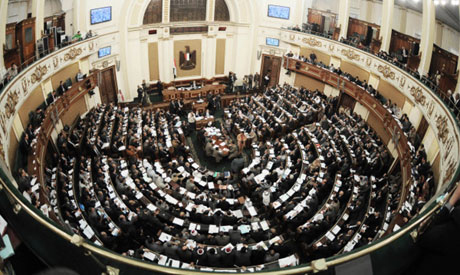
File photo: A general view of the Egyptian parliament during a working session in Cairo, Egypt (Photo: AP)
Members of Egypt's parliament have condemned the deadly terrorist attack on two mosques in New Zealand that left 51 people dead and dozens injured, highlighting also the urgency of international cooperation to fight terrorist acts.
"The world woke up Friday morning, 15 March 2019, to a tragic terrorist incident, after the execution of two terrorist attacks on two mosques in Christchurch, New Zealand, leaving 49 people dead and many others wounded," a joint statement read on Saturday.
The members stated that the attack runs contrary to all human values, killing civilians while performing religious rites of worship. "We extend our deepest condolences to the families of the victims, the people of New Zealand and the peoples of the world," the statement read.
The statement added: "Remembering the painful incident, we all remembered the incident of Al-Rawda mosque in northern Sinai in 2017, which claimed the lives of 305 people, as well as the bombing of the Cathedral Church in December 2016, which killed 29 people and injured 31 others. Today, New Zealand is suffering from a painful incident. The motives and reasons differ. However, it emphasises that terrorism, whatever its religion or orientation, is ultimately terrorism that threatens the security and stability of states."
"While we strongly condemn this incident and give our categorical rejection of all forms of violence and murder, we have found that the best solution to prevent terrorism is to confront ourselves first and foremost with the reality of the situation.
"The incident represents a new reminder of the need to continue and intensify international efforts to combat terrorism and to confront all forms of violence and extremism.
"The terrorist attack on New Zealand's mosques shows a dangerous indicator of the rise of hate speech against foreigners and Islamophobia. Here we would like to refer to a study published in Newsweek magazine by researchers from the University of Georgia, which dealt with the attacks in the United States between 2006 and 2015. It pointed out that only 12 percent of terrorist attacks in 10 years were committed by Muslims. It is a clear and frank response to Australian Senator Fraser Aning's reading of the tragic incident we are about to condemn.
"The New Zealand attack perpetrator is not Arab or Muslim, as some claim, and this may be the beginning of a new terrorist organisation, as the perpetrator belongs to the extreme right.
"The statements written on the terrorist's weapon confirm the extreme animosity towards Islam and Arab immigrants."
The members then emphasised the need for all countries of the world to develop a plan and strategy to deal with terrorism, else it will increase and spread; the need for international communication between parliaments of the world through the International Federation of Parliaments, to come to a common definition of terrorism and hate crimes, as well as work on the enactment of laws to punish terrorism, and to emphasise that terrorism has nothing to do with any religion, but terrorism is aggressive behavior regardless of the religion of its perpetrators.
Members also underlined the need to unite the countries of the world to address the financiers of terrorism and extremism and the providers of safe haven for them. Also the need to train and equip migrants to integrate into the communities that receive them.
Members asserted the need for the countries of the world to adhere to the statement of the Sheikh of Al-Azhar and the Pope of the Vatican in the United Arab Emirates, which calls for peace and love among peoples, regardless of differences of religion.
Also the need for comprehensive and real solutions to confront the causes of terrorism and violence, including: the need to agree on pragmatic mechanisms for migration from one country to another, with the obligation of the immigrant to engage in training for integration within the immigrant community; spreading religious tolerance and principles that accept each other and instill the concept of human brotherhood in schools since childhood; launch a global campaign against extremist religious leaders and teachers; underline the need to cultivate a culture of difference and that man has to love his brother, even if he differs intellectually, religiously or culturally.
Members also asserted the need for social media owning companies to delete any content that incites violence. The owners of social media networks and global search engines should quickly commit themselves to cooperating with security agencies around the world through the UN Security Council and the United Nations to report any person who incites murder or violence through them.
Great efforts should also be made towards bolstering the cause of peaceful coexistence and the prevention of extremism and terrorism. The call for the suppression of terrorism should also apply to government practices towards their peoples and the practices of the superpowers towards weaker states of the world. "If we continue to justify the crime in some cases, we will deepen the root of terrorism and even legitimise it," the statement read.
Short link: